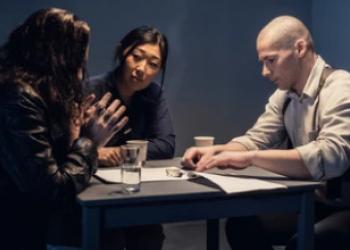
An In-Custody Suspect’s Reinitiation of Interrogation after Repeated Invocations
An in-custody suspect’s repeated invocations of his right to silence and his right to the assistance of counsel do not necessarily prevent him from later changing him mind and agreeing to talk. The reinitiation of law enforcement’s ability to question the suspect is a matter of the suspect’s choice. But the suspect’s waiver of his rights may be inferred under the circumstances.
Defendant Michael Raymond Johnson married G.A. in 1985, but maintained very little contact with her over the ensuing years. In 1996, however, they renewed their relationship and began living together in Ojai, California. Living with them was G.A.’s 15-year-old daughter, D.G., the product of another relationship, and her boyfriend; Francisco. Defendant was jealous over G.A.’s relationship with D.G.’s real father, and also suspected that she was messing with Francisco. So defendant moved out of the house. But then two days later, on July 17, 1996, defendant showed up at the residence where G.A. worked as a housekeeper. Armed with two pistols, defendant professed his undying love for G.A., telling her that he had to stay with her “every minute of every day.” G.A. couldn’t reason with him (as he ranted on about robbing a bank and taking her to Wisconsin) or get him to relinquish his firearms. So, after defendant told her he was prepared to take her by force, she eventually got her employer’s permission to leave. After going to G.A.’s house first, they eventually headed up to a mountain spot where they’d made love before; G.A’s compliance with his demands the product of defendant’s erratic mental state. After an unsuccessful attempt to have intercourse, they went back to G.A.’s house where they showered together, defendant keeping his guns within reach the whole time. G.A. later testified that at no point that day did she feel she could get away from him. Meanwhile, someone (probably D.G. or Francisco) called the police to report a “domestic disturbance.” Deputy Sheriffs Peter Aguirre and Steven Sagely responded to the call, with Deputies James Fryhoff and David Sparks responding as backup. Deputies Aguirre and Sagely approached the front door of the house and knocked. A visibly upset G.A. (in her bath towel) opened the door and told the officers that defendant was inside, warning them that he had guns. Deputy Aguirre made an immediate entry as everyone else held back, taking cover when they suddenly heard shots being fired. Defendant came out of the front door, shooting at Deputy Fryhoff. Deputy Fryhoff shot back, wounding defendant in the chest. Deputy Aguirre—found in the house with gunshot wounds to the forehead and struggling to breathe—died from his injuries. His fully loaded sidearm was still in its holster. A later autopsy revealed that Deputy Aguirre had been shot three times; once in the left arm and twice in the forehead. Stippling showed that the two head shots were with the muzzle of defendant’s gun only 12 to 18 inches from Deputy Aguirre’s head. Investigators repeatedly attempted to interview defendant when he was first taken to the emergency room of a nearby hospital as he was being treated for his chest wound and over the span of the next three hours, defendant invoking his right to silence and/or to the assistance of counsel four times in that time span. On one of those attempts, defendant said that he was a “little bit in shock right now . . . (but that he) may want to talk to you later.” Shortly thereafter, while asking defendant for permission to search his house, defendant was asked if he’d be willing to talk to a psychiatrist. Defendant said that he would. Other questions were asked about his mental history which, due to the lack of a Miranda waiver, were subsequently suppressed. Ventura County Sheriff's Detective Robert Young returned shortly thereafter and asked defendant if he was ready to discuss the shooting, reminding him that he had said earlier that he might be willing to talk later. Defendant told the detective in a fifth invocation that “no,” he’d rather talk to a lawyer first. Detective Young left, but returned shortly thereafter and angrily chastised defendant, telling him that it was not just a “uniform” he had shot, but rather a “living, productive human being, unlike” defendant, and that he wanted him to know the name of the deputy he had murdered, that he was 26 years old, had a wife and a child, and that defendant needed to remember Deputy Aguirre and his family “every minute of every day for the rest of his life.” After defendant was transferred to another hospital that same evening, psychiatrist Donald Patterson contacted defendant. Hired by the District Attorney’s Office, Dr. Patterson’s services were employed to evaluate defendant’s mental state as a homicide suspect (a common prosecutorial practice), and not necessarily to obtain incriminating statements. Unaware that defendant had invoked his right to counsel, being told only that defendant had invoked his right to silence, Deputy District Attorney Richard Holmes told Patterson to readvise defendant of his Miranda rights and see if he was ready to talk. DDA Holmes later acknowledged that had he known that defendant had invoked his right to counsel, he would have told Dr. Patterson not to question defendant at all, but merely watch and observe. After observing defendant for about an hour as a surgical resident treated him, Dr. Patterson finally introduced himself to defendant, telling him that the DA’s Office had asked him to come and talk with him. Defendant responded: “Great.” After providing defendant with a very abbreviated version of a Miranda admonishment (despite being supplied with an admonishment card), defendant told Patterson “I don't think so,” and that he’d rather talk to an attorney first. Acknowledging that that was his right, Patterson told him said that he’d just hang around for a while should defendant change his mind. About 20 minutes later (during which time defendant had x-rays of his chest taken), after noticing that Patterson was still in his room, defendant said: “Still here, huh?” Defendant then asked Dr. Patterson; “You wanna talk about it?” When Dr. Patterson responded; “Sure,” defendant dictated the terms of their discussion, telling Dr. Patterson: “I’ll talk, and you can listen,” and; “Cause you, you don’t mind, and we could just talk about what has happened or something.” So defendant began talking about the shooting and the kidnapping although Patterson helped him along with a few questions. During the ensuing discussion, defendant made a number of incriminating comments to the effect that he had in fact kidnapped A.G. and intentionally shot Deputy Aguirre. At no time during this discussion was he readvised of his Miranda rights nor was an express waiver ever obtained. On trial in state court for murder (with special circumstances) and kidnapping, defendant’s incriminating statements were used against him over his objection. Convicted and sentenced to death, defendant’s appeal to the California Supreme Court was automatic.





